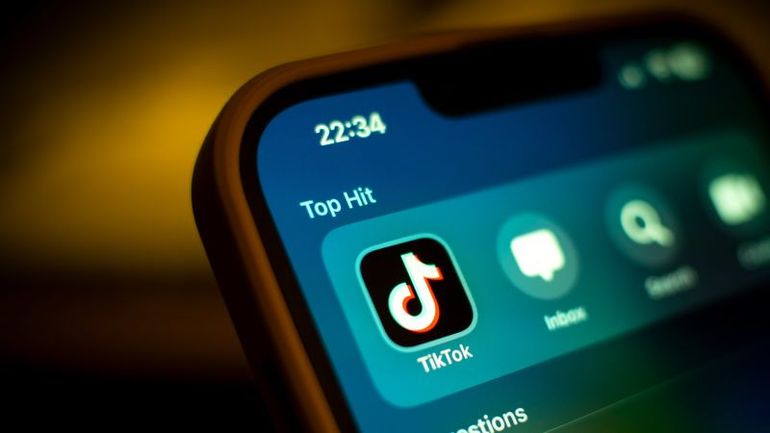
TikTok takes legal action to prevent upcoming US app ban

In a proactive move, TikTok has filed a lawsuit to halt the enforcement of a new US law that may result in the widespread prohibition of the beloved app. This legal action follows TikTok's earlier warnings and comes in response to the recent signing of the legislation by President Joe Biden.
TikTok took legal action on Tuesday to prevent a US law that could lead to a nationwide ban of the app. This comes after President Joe Biden signed the legislation last month, following through on the company's earlier warnings.
This legal challenge is significant as it will decide whether US national security worries regarding TikTok's connections to China are more important than the First Amendment rights of the app's 170 million American users.
The outcome of the case is crucial for TikTok's future. If TikTok loses, it may face a ban from US app stores unless its Chinese parent company, ByteDance, sells the app to a non-Chinese entity by mid-January 2025.
On Tuesday, TikTok and ByteDance filed a petition at the US Court of Appeals for the District of Columbia Circuit. They claim that the law is unconstitutional as it restricts Americans' freedom of speech and hinders their access to lawful information.
The petition argues that the US government has unfairly targeted and prohibited the short-form video app, claiming it is an unconstitutional overreach of congressional authority.
According to the petition, this is the first time in history that Congress has passed a law specifically banning a single platform from operation nationwide, preventing all Americans from engaging in a global online community with over 1 billion users.
The White House redirected inquiries regarding TikTok's legal challenge to the Justice Department. They have not yet provided a comment in response to the request.
For years, the US has raised concerns about TikTok's connections to China. There are fears that this could lead to the exposure of Americans' personal data to the Chinese government.
TikTok has refuted claims of sharing US user data with Chinese government officials. They have stated that they are protecting the information by storing it on servers owned by Oracle, a US tech company.
The government panel known as the Committee on Foreign Investment in the United States is currently reviewing TikTok's US operations based on a 90-page draft agreement. This agreement includes provisions that allow the US government to shut down TikTok if certain obligations are violated.
Despite these provisions, US officials remain concerned about the potential risks associated with TikTok. They are worried that China could exploit the app's data for purposes such as identifying intelligence targets, spreading propaganda, or engaging in covert influence.
The US government has not provided any solid proof that the Chinese government has access to TikTok data. US lawmakers have received classified briefings from national security officials, but no information from these meetings has been made public.
Reactions to the briefings have varied. A House Republican stated that there was no concrete evidence presented, while a House Democrat expressed the need to make a judgment call on how to address potential influence from China.
Virginia Democratic Sen. Mark Warner, a supporter of the TikTok legislation, mentioned in a Senate floor speech in April that the briefings offered important insights into the potential risks posed by TikTok.
Warner pointed out that many Americans, especially young people, may be hesitant about the legislation targeting TikTok because they have not had the same access to information as Congress. He highlighted that the classified briefings held by Congress have provided a deeper understanding of the threats associated with foreign control of TikTok.
In March, concerns reached a peak when a bill was passed, giving TikTok about six months to sell or risk being banned in the US. Initially approved by the House, the bill faced delays in the Senate. Eventually, an updated version of the bill was rushed through and added to a significant foreign aid package supporting Israel and Ukraine.
US lawmakers have labeled the law as a demand for TikTok to sell, rather than an outright ban on the app. However, TikTok has maintained that a ban would likely be the end result if the law is enforced.
Tuesday's petition stated that the 'qualified divestiture' required by the Act for TikTok to keep operating in the US is not feasible, whether from a commercial, technological, or legal standpoint.
The petition also raised concerns about the implications for the First Amendment.
TikTok and ByteDance criticized the national security concerns behind the TikTok legislation as "speculative and analytically flawed." They argued that the bill's quick approval showed that the lawmakers relied on speculation rather than evidence, not meeting the standards of the First Amendment.
According to First Amendment experts, TikTok's arguments have some validity. The Supreme Court has ruled that the US government cannot stop Americans from accessing foreign propaganda if they choose to do so. Additionally, the Berman amendment prevents US presidents from blocking the flow of media from foreign countries, even those with hostile relations with the US.
Evelyn Douek, an assistant law professor at Stanford University who specializes in online platform regulations, believes that national security concerns should not take precedence over the First Amendment. She argues that without this protection, the Constitution would be meaningless. She also emphasizes the importance of the government providing evidence to support its claims. Despite this, she notes that the Supreme Court has sometimes overlooked these principles, especially in cases involving counterterrorism and foreign speech.
Last year, TikTok secured some early victories in court when several US states attempted to restrict the app, setting the stage for future battles over online speech. In Montana, the only state to have implemented a TikTok ban on personal devices, a federal judge temporarily blocked the law. The judge ruled that the state legislation violated users' First Amendment rights and disrupted a source of income for many individuals.
Gautam Hans, associate director of the First Amendment Clinic at Cornell University, believes that the bipartisan nature of the law signed by Biden could help the courts understand the seriousness of national security concerns regarding TikTok. However, Hans points out that without a public discussion on the specific risks involved, it is challenging for the courts to justify such an unprecedented law.
Furthermore, in addition to potentially violating the speech rights of US TikTok users, the federal law being challenged by TikTok also raises constitutional issues for Apple and Google. If a ban on TikTok were to be implemented, their app stores would be prohibited from carrying the app.
Jennifer Huddleston, a research fellow at the libertarian Cato Institute, expressed concerns about the government potentially intruding into the decisions of online platforms on what content to host. She also warned that such intervention could set a dangerous precedent for government involvement in the online space that many would oppose in the offline world.
In the US, TikTok has been restricted from government devices by both the federal government and over half of the states. This reflects the government's authority to manage its own property. Internationally, TikTok has faced bans on government devices in Canada, the United Kingdom, and the European Commission. Additionally, India has imposed a complete ban on the app since 2020.
Some US officials have been pushing to ban TikTok from the United States since 2020. Former President Donald Trump initially tried to block the app through an executive order, but he has since changed his stance. Trump now believes that banning TikTok would benefit Meta, a company he holds responsible for his loss in the 2020 election.
According to Douek, the outcome of the TikTok case could have significant implications for how the US government oversees technology and foreign speech.
Douek emphasized the significance of considering not only TikTok but also all foreign platforms in the future. He pointed out that in a globalized world, this issue will continue to arise. Handing the government the authority to ban a platform based on potential future harm rather than clear and present dangers is a cause for concern.
Editor's P/S:
The legal battle between TikTok and the US government highlights the complex interplay between national security concerns and the protection of First Amendment rights. The government's concerns about the app's potential ties to China and the risk to American data raise legitimate security questions. However, TikTok's argument that the law violates its users' freedom of speech and sets a dangerous precedent for government censorship is also valid.
The outcome of this case will have significant implications for the future of online speech in the United States. A ban on TikTok would not only affect its 170 million American users but could also embolden other governments to restrict access to foreign platforms based on perceived threats. It is crucial that the courts carefully weigh the government's national security concerns against the fundamental rights of individuals to access information and express themselves online.













